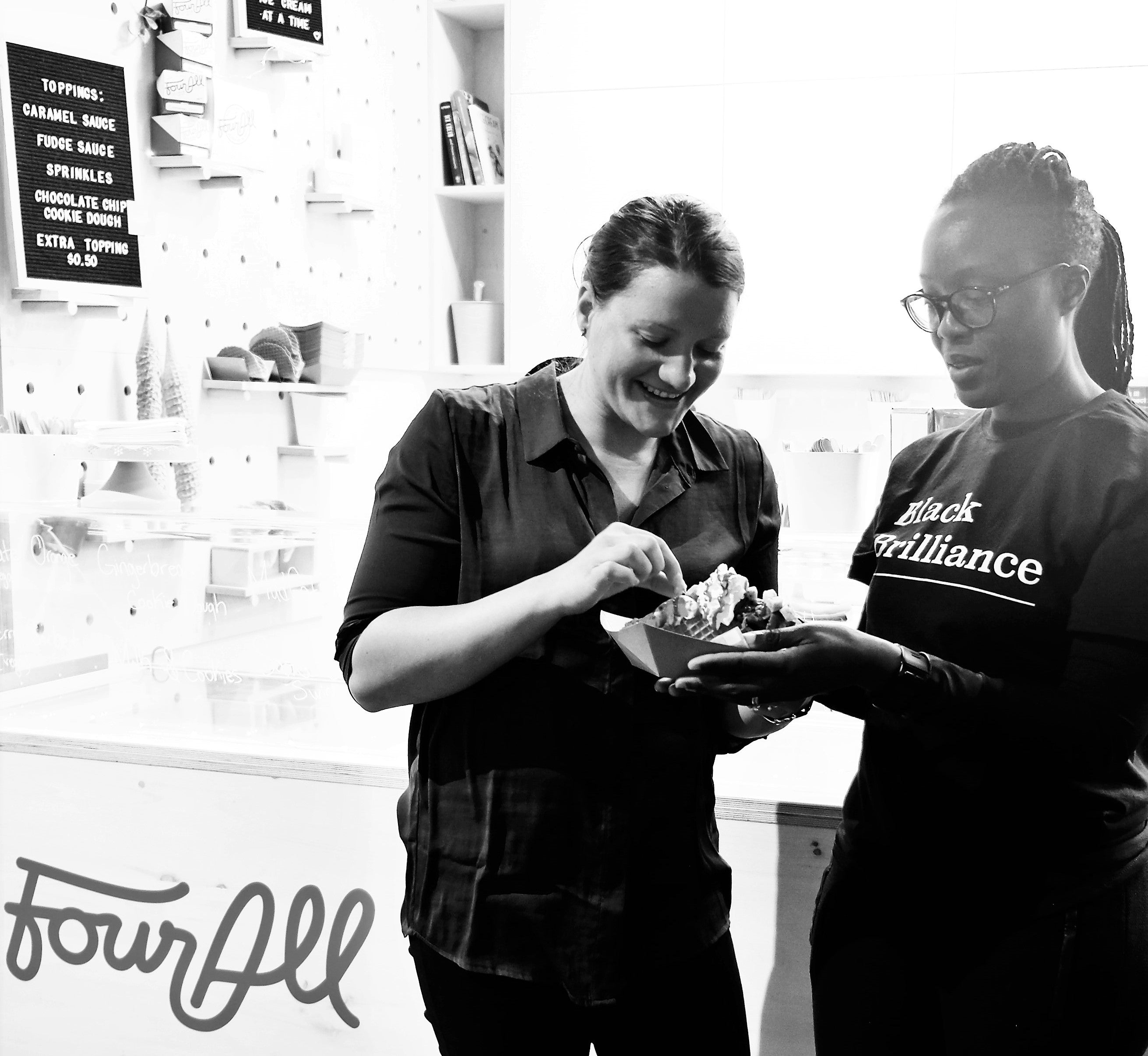Tell-All Thursday: Science, Osterberg, & Women of Ice Cream

Ice cream is so much more than a treat; we know that ice cream can bring wonderous surprises and innovation. Ice cream is a meeting place for understanding and observing the culture and ingredients in our food systems then recognizing the responsibilities that we wish to uphold as makers. For this week's Tell-All Thursday, we're reflecting on a visit from our friend Cathrine Osterberg, the science at the core of ice cream making, and women in the ice cream industry.

The Science of it All
Last week, Cathrine Osterberg, owner and maker of Osterberg Ice Cream in Denmark, visited our Cone Counter. Ajoa first met Cathrine when she was studying ice cream science at the University of Guelph and Cathrine was completing her thesis with their professor, who happens to be one of the world's leading ice cream researchers. Both Ajoa and Cathrine entered the ice cream world with somewhat unconventional backgrounds compared to a usual culinary career, rooted in science and followed by practice. Obviously, Catherine became one of Ajoa's very first mentors as someone that was using her master's thesis to apply the science she learned to her new business. "Just seeing someone who had achieved [their goals], but in a way that I respected, it was great to meet and interact with her", Ajoa recalls, "We met in a café in Guelph, and it was just me and a piece of paper". Four months after that meeting, Ajoa opened up the Four All Tasting Room.
Back in Denmark, Cathrine runs her own ice cream company, performs consultancy work for other ice cream businesses who are seeking to improve their recipes, runs workshops for ice cream making, and is recognized with honours for her valuable efforts in Danish gastronomy. Her 3.5 hour course on ice cream making focuses heavily on the science of how it's done. She says, "people just turn up and think 'this is going to be fun' and I'm like 'nuh-uh, you're going to go into hardcore science'. We go through the calculations, what you have to think about and what happens if you replace something. We do quite a lot of different batches so they can see the difference between using egg yolks, not using egg yolks, making sorbet, [and] making it different ways." Cathrine recalls the reaction of her students not realizing they were signing up for science class when they decided they wanted to make their own ice cream.
Osterberg at Four All
Needless to say, we were very excited when we heard Catherin was coming to Canada to teach at the University of Guelph and had plans to visit our Cone Counter to do some taste testing. As she tasted each of our ice creams, Cathrine's insights were put to work right away and she offered us advice on our sorbet recipe. Ajoa mentions that before the announcement of her visit, she planned to reach out to Cathrine because of the notable creaminess in Osterberg's sorbets and was hoping for some advice. "With us, we can go up to half of our ice creams as sorbets because people, they really like them because they're creamy and they don't notice a difference", says Cathrine.
The visit was also an opportunity for Ajoa to reflect on her current role at Four All and how much science still influences her everyday work: "I don't even know what I do; I don't make ice cream anymore, I don't scoop ice cream anymore... but I'm the only one that does product development. For me, it's not as simple as 'let's just throw stuff in and hope it works'; it starts off with an excel spreadsheet, analyzing how much water content is in a strawberry, how much sugar content is in a strawberry... and developing relationships with suppliers".

Women in Ice Cream
Ajoa very much appreciated that Cathrine's visit to Four All and her interaction was collaborative: "We shared formulations and we were interested in helping each other improve our businesses respectively. I think stuff like this happens specifically because we're women", she reflects. Her observations from working in the male-dominated engineering field and now in the male-dominated food industry are that women often need to compromise by either being mean or sexualizing themselves to get ahead. Ajoa is a technical person; she's not a chef and never intended for Four All to be so immersed in the food industry where she would witness a culture of toxic masculinity. "I have that luxury of being an outsider in the industry; I don't know what the rules are to even conform to the rules, and I'm not interested to know what the rules are", says Ajoa.
Cathrine also reflected on her observations of women working in food science and ice cream: "We've had a lot of young girls, like my age, that just decided to open an ice cream shop. I can see they're really working hard and struggling, some of them, but that just really changed the whole scene because before it was all guys and now it's like the best ones are actually the girls". She thinks that the intense physical work that comes with the mental labour of working in the culinary industry may be what stops more women from joining. "Physically, there's some days you're working from early mornings to late nights and you're sore in your entire body. It's hard work; when we get our deliveries we have 600 kilos of goods we have to carry down stairs. Most people just aren't used to working like that".
The difference in attitudes for Ajoa and Cathrine is neither of them are trying to compete; they trailblaze instead through collaboration. This could also be attributed to their scientific backgrounds, where they are continually searching for new knowledge and opportunities to learn from one another. Ajoa concludes how her and Cathrine are confronting the status-quo of men on top and paving new trails in the industry: "We celebrate other women, we celebrate other businesses, we celebrate other people who are working hard and trying to move forward".

